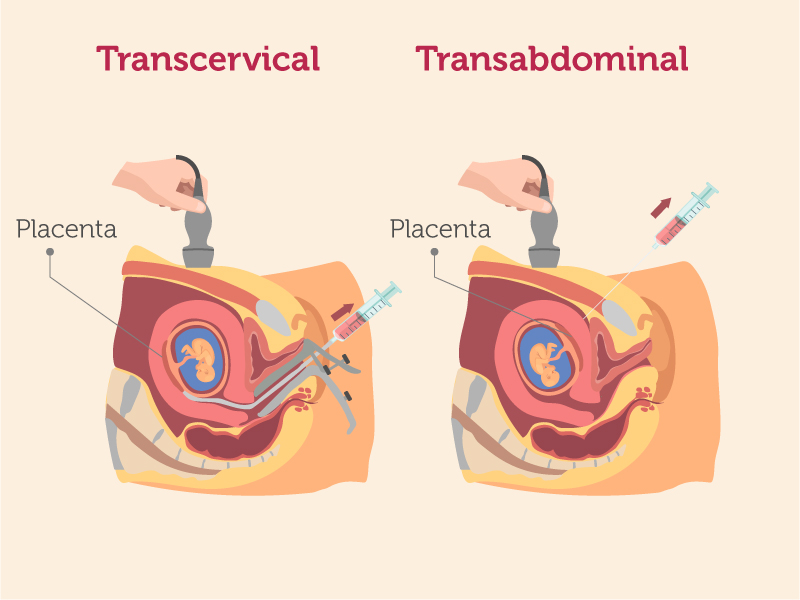CVS can be performed from 11 weeks’ of pregnancy. Most cases are done between 11-14 weeks.
You are first scanned to check that the heart is beating, to confirm how far along the pregnancy is, to see the early development of the baby and the location of the placenta to see if it is possible to do the test.
Most women have the sample taken through the abdomen (also called See image
transabdominal
). Occasionally, if we think it is safer for the pregnancy, the sample is taken via the neck of the womb (See image
transcervical
).
If you have the more common transabdominal CVS, your abdomen is cleaned with antiseptic. We will also offer you an injection of local anaesthetic to numb the skin. When the skin is numb, we insert a small needle through it, through the womb and into the placenta under direct guidance by ultrasound. A small sample of tissue (the chorionic villi) is then taken from the placenta for testing.
Sometimes before the CVS happens you may be asked first to fill or empty your bladder, depending on the position of the placenta. Many women describe the test as uncomfortable rather than painful, and some women report period-like pain afterwards. You can take paracetemol for pain relief.
The test takes approximately 5-10 minutes and you will be taken to a quiet area to relax until you feel able to go home, usually about 30 minutes later
Initial CVS results are usually available in around 3-5 days. This result (the ‘PCR’ rapid test) will just identify abnormalities of chromosomes 21 (One of the most common chromosomal abnormalities in humans. All chromosomes come in pairs, but Down’s Syndrome is caused by an extra copy of chromosome 21.
Down’s Syndrome
), 18 (All chromosomes come in pairs, but Edward’s Syndrome is caused by an extra copy of chromosome 18.
Edward’s Syndrome
) and 13 (All chromosomes come in pairs, but Patau’s Syndrome is caused by an extra copy of chromosome 13.
Patau’s Syndrome
), which are the commonest chromosomal problems. Testing for other genetic conditions may take up to 2 weeks.
The test is able to diagnose whether your baby has a chromosomal disorder (such as One of the most common chromosomal abnormalities in humans. All chromosomes come in pairs, but Down’s Syndrome is caused by an extra copy of chromosome 21.
Down’s Syndrome
), or whether a baby has inherited a genetic disease that can run in families (such as Sickle cell trait and disease is an inherited condition. Within each red blood cell is a structure called haemoglobin that carries oxygen (for energy) to the body’s cells. In sickle cell the structure of the haemoglobin is abnormal.
Sickle Cell
).
However, even if the results from your CVS are normal, it doesn't guarantee that your baby will be born healthy. We can diagnose a number of chromosomal or genetic abnormalities from a CVS but not all. Some common abnormalities that are picked up on scan, such as defects of the heart, stomach, intestines, or brain and spine, are sometimes caused by ‘faults’ in the genes, but mostly they are problems that came about when the embryo developed at the beginning of the pregnancy.
You may feel anxious before and after the test. You may notice some cramping for a few hours afterwards. This is normal. You can take paracetamol for any discomfort. You do not need to rest or stop driving after the procedure.

